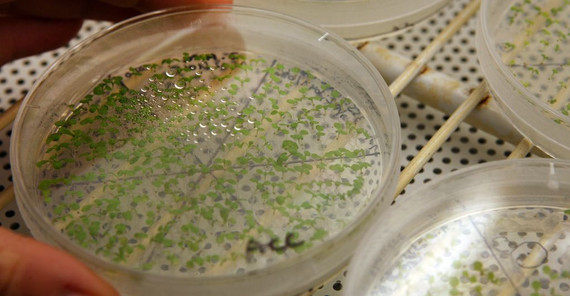Drought, heat, caterpillars, hail - plants cannot run away from dangerous situations. They have to cope with stress in a different way. Biologists are presently on the track of a phenomenon that they call "molecular plant memory". Molecular biologist Isabel Bäurle examines the role played by the genome packaging of a plant.
Two small green seed leaves on a tiny stipe - the delicate little plants are six days old. They grow on a light, gel-like culture medium in a closed petri dish. In "their" culture cabinet at the Institute of Biochemistry and Biology on the Campus Golm they feel very well. 16 hours a day the light shines, the temperature is at 23 degrees Celsius. These are ideal conditions for growth. What the young seedlings of Arabidopsis will have to endure in a few hours not all of them will survive. For an hour they will be exposed to a temperature of 44 degrees Celsius in the lab - heat stress that only well-adapted plants can bear.
Isabel Bäurle takes a close look at the petri dish in her hand. The bottom of the dish is divided into six different sectors that are marked by black lines. In each sector the growing plants have a slightly different genotype that was changed by mutation. The molecular biologist wants to find out why some plants survive the heat and others die. "We are interested in the stress memory of the plants," the scientist explains. She got the renowned Sofja Kovalevskaja Award and is doing research as a visiting professor at the University of Potsdam in the next five years. With the prize money of 1.65 million Euros granted by the Alexander von Humboldt Foundation, she is setting up her own research group. In addition, she was appointed to the junior professorship Epigenetics of Plants at the University of Potsdam just recently.
The plantlets in the petri dish will not experience heat for the first time in their young lives. They have already survived a temperature of 37 degrees Celsius to which they were exposed once without any problems. The scientists know by now: Through such a "heat training" plants can survive a second, potentially fatal, heat event. However, without such adaptation they will not live on. The plants also react with adaptation to other stressors like drought or traumas due to animals. Little research has been done to date about how this adaptation is maintained or how the information of an experienced stress reaction is stored. Biologists assume that plants have a kind of molecular memory that enables them to react to stress they have experienced before faster and more efficiently when it occurs a second time. The key to plant memory lies in the DNA.
"We think that certain genes are responsible, which are switched on by stress," Isabel Bäurle explains. Genes activated in this way contain the code for specific proteins that protect the plant - for instance by modifying the cell membranes. "Our central hypothesis says that genes switched on as a result of stress will be active much faster in the next stress event," Bäurle says. First results indicate that the reasons for this lie in a modified structure of the proteins that wrap the DNA. In the laboratory, the biologist works with mutants of the Arabidopsis that have a modified stress memory. The scientists bred more than 5,000 mutations by treating the plant seed with chemical mutagens. Randomly distributed mutations developed in the genetic material of the plants in this way. Then the researchers tested which of these plants had the ability to establish a heat memory. Some of them lost their molecular stress memory and became "forgetful". Some others had longer lasting "powers of recall" for stress situations. If the researchers identify those genes in them that were modified by mutations, this will indicate the genes that are responsible for the heat stress memory in wild types.
"It is our goal to provide our knowledge for breeding better adapted agricultural crop," Isabel Bäurle explains. Stress-resistant crop will play an increasingly important role in agriculture in view of climate change with its anticipated growing number of heat and drought periods. "Plants cannot run away from stress. They have to cope with it at the location of their habitat," the biologist states.
Before Isabel Bäurle came to Potsdam, she had done research at the John Innes Centre in Norwich, England for five years. There she already focused on the memory of plants in her work. She investigated vernalization. This is how biologists call the phenomenon that certain plants only flower after exposure to a prolonged cold period. She can resort to the methods she learnt in England to investigate the molecular memory of plants in her present research work.
Isabel Bäurle is group leader and supervises five doctoral candidates and several staff members and students. Establishing a new team is an exciting challenge for her. You can achieve more with a team than alone. "You also have to be a bit of a manager," she points out. But the 38-years old biologist has already gained experience with this in her private life. She is the mother of two young children. She returned from her parental leave just a few months ago. "Organisation, self-discipline, and support of the family" helped her to manage the balance between family and scientific career.
She puts the petri dish with the Arabidopsis seedlings back into the lit-up culture cabinet. Some of these plants will be just dry and faded rests the next day. The others will grow on.
The Scientist
Dr. Isabel Bäurle studied biology in Freiburg. At present she is visiting professor in the group on the molecular memory of plants of Professor Bernd Müller-Röber. She was recently appointed to the junior professorship of Epigenetics of Plants at the University of Potsdam.
Contact
Universität Potsdam Institut für Biochemie und Biologie Karl-Liebknecht-Str. 24-25, 14476 Potsdam OT Golm
E-Mail: isabel.baeurleuuni-potsdampde

